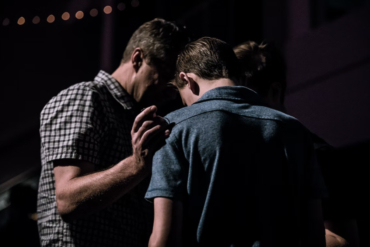At one level the notion that churches exist to change lives seems self evident. The church, by definition, is the gathering of the “called out” ones. We are the people who have responded to God’s call in our lives. Committed evangelicals realize that ultimate change in the lives of people only occurs with the new birth. Entering into relationship with Jesus Christ through His atoning blood on the cross makes it possible for Mary, Zaccheus, Lydia, Paul, and you and me to experience forgiveness and new life from Almighty God. Peace with God is only possible through a transformed life on the basis of God’s free gift in Christ.
On another level, many in the evangelical church today would resist the idea that changing lives is the “business” of the church. Many of us would demur that since only God changes lives, that our business is proclamation alone. “We proclaim it, people decide whether or not to respond, and our job is finished”. This mindset has been cultivated concurrent with a changing American landscape where more people than ever before affirm a basic belief in God and live lives of ever greater moral decay. Some would suggest that we are not “slouching to Gomorrah”, rather that we are freefalling towards it. Something is radically wrong with our society and the church is, tragically, often found either on the sidelines or locked into a presumably safe haven.
We want to make the argument that the evangelical church in Northern Nevada must engage our culture. We want to contend that it is the responsibility of the church to minister to people in pain, to lift up the light of God’s righteousness in the dark places of our world, and to engage our culture in the “public square” in order to impact the environment in which our proclamation takes place. In short, we want to suggest that being “salt and light” means the church and its members do more than simply proclaim. We proclaim, we reach out, we minister, we challenge, we advocate, and we confront. At every level, we engage in what we recognize as a battle that has serious spiritual consequences. We also affirm that the battle is not “out there”, but indeed it is right within our churches as well.
To these ends, we the undersigned commit ourselves to faithful witness in our communities and to becoming a powerful witness for Christ in our respective ministries. We are not interested in forming yet another organization to take its place in the crowded field of self interested lobbyists. Rather, we are concerned to let the light of Christ shine in both our individual AND corporate witness. Listed below are several affirmations which have helped shape our hopes and dreams for the future of evangelical ministry here in Northern Nevada.
* All Social problems have spiritual roots. Teen pregnancy, alcoholism, suicide, abortion, gambling, prostitution, pornography, serial divorce and child abuse all are social symptoms of a longing for peace, fulfillment and joy. Northern Nevada is full of people pursuing destructive means to achieve what only a right relationship with Christ can bring into their lives. Our adversary Satan is providing a full menu of alternative meals which, when consumed, produce only pain, brokenness, and despair. Our culture has paid the price for its sin. The church must reach into these pits of pain with ministry to reach the hurting and wounded. Ultimate transformation in our world will only come when people are rightly related to Christ. When the church has broken through the barriers of unbelief and sin, we will see social transformation such that the specific behaviors in our culture will change.
* The church will engage the culture at every level. Most importantly, we commit to passionate praying for righteousness to prevail in our society. We will also commit to challenging, confronting, and engaging our society at the places where decisions get made and values get shaped in our world. This means that spiritual leaders (pastors, elders, teachers, and others involved in the shepherding ministry of the church), will equip and mobilize Christ followers to focus outward in their Christian experience. We will not be content to have a “holy huddle”. We see our mission field as the neighborhoods, workplaces, malls, schools, government centers, and centers of powers of our day. We will engage our culture at every level and not abdicate our presence or purposes in the larger spheres of society.
* Our mandate for ministry is inherent in our message. Scripture makes it clear that the heart of God is for the lost, the last, and the least. We are compelled to reach not only to the ends of the earth with the Gospel, but to the darkest corners of our own culture. Were we to abandon our own culture as a stronghold of evil, we diminish the entire Great Commission and suggest its powerlessness to bring about transformation of the heart. Sound Biblical exegesis compels us to meet the needs of people around us rather than withdrawing within our various subcultures. Paul, in Acts 24:25 took his opportunity for conversation with a highly placed elected official to discourse about “righteousness, self control, and the coming judgment.
* The evangelical church in our area can have a united witness to our world. We are NOT advocating some form of “super church”, nor are we interested in any form of ecclesiastical union. What we are interested in is the fulfillment of Jesus’ prayer in John 17 in our community. Differences in worship style and philosophy of ministry are both understood and accepted. However, we affirm that the Bible is God’s Word and that people who do not have a relationship with Jesus Christ are lost and without hope. To that end, we are united in our desire to proclaim Jesus Christ by word AND by our deeds in the public square. We endeavor to “maintain the unity of the Spirit in the bond of peace” in our relationships with one another so that the Gospel can be proclaimed and portrayed in our culture.






